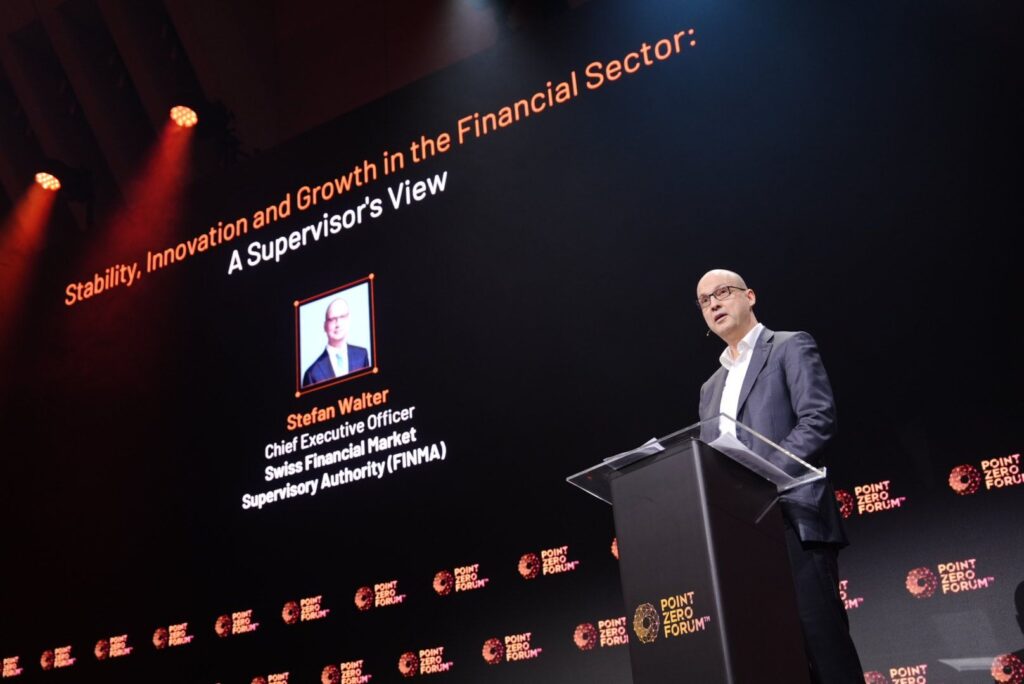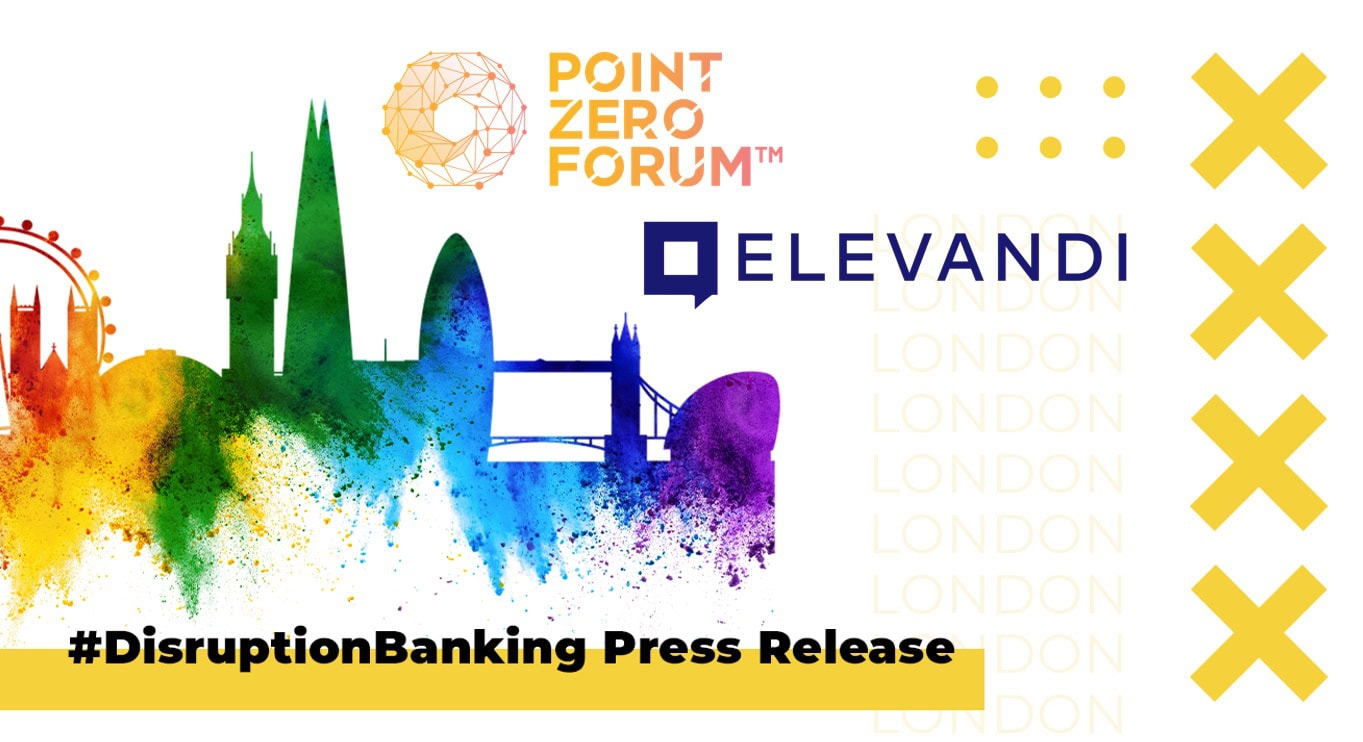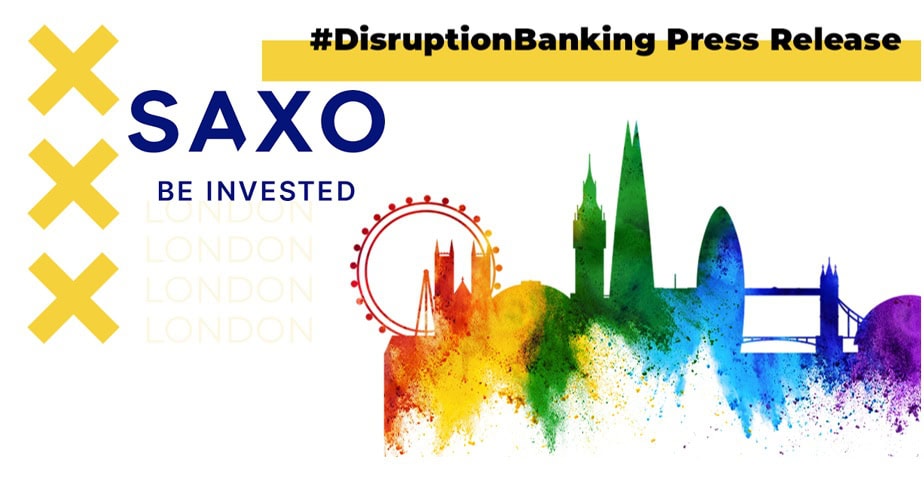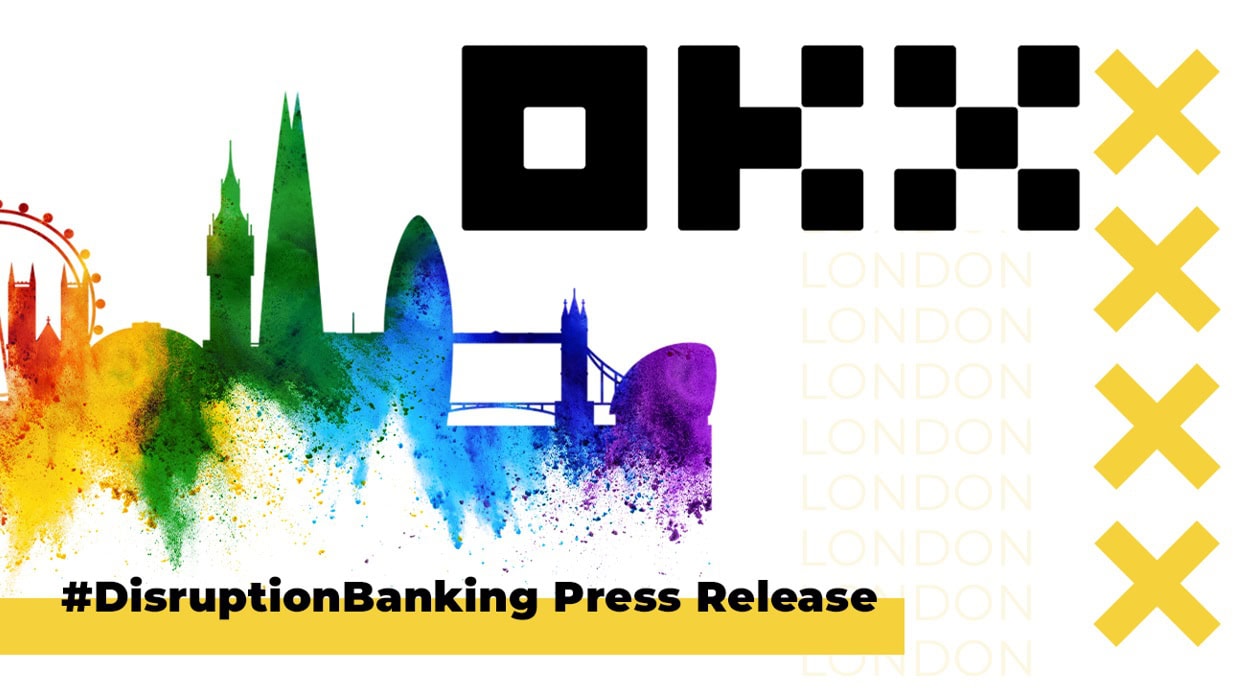On Wednesday, July 3rd, central bankers, policymakers, fintech leaders, technologists, and investors gathered for the concluding day of Point Zero Forum at The Circle in Zurich. Through a series of roundtables, keynotes, and panels, participants continued their exploration of the future of finance through the lens of responsible AI adoption, quantum technology, digital assets, and payment frameworks, and climate tech.

On day three, the Forum opened with a talk from Stefan Walter, Chief Executive Officer of the Swiss Financial Market Supervisory Authority (FINMA) to discuss growth and innovation in financial markets. During his talk, which you can view here, Stefan explained that effective supervision and regulation of financial innovation must remain technology-agnostic, prioritising risk assessment rather than favouring specific technologies. He added that innovations leveraging technologies like DLT and cryptocurrencies must be scrutinised for their impact on market integrity rather than the technology driving them. Additionally, he noted that clear regulatory frameworks, such as Swiss DLT and MiCA laws, are crucial for guiding new business models and maintaining trust in financial services.
The morning’s thematic focus on financial assets continued as Sopnendu Mohanty, Chief FinTech Officer, Monetary Authority of Singapore & Chair of the Board of Directors, Elevandi, was accompanied on stage by Circle CEO and Co-Founder, Jeremey Allaire. Building on Circle’s announcement this week that the technology firm had secured the first EMI stablecoin license under the European Union’s new MiCA regulations, Jeremy expressed his excitement for the future of digital money and the legitimacy legal certainty brings to the world of electronic cash.
“This is a really big deal. You have the European Union – one of the biggest economies in the world. You have the most comprehensive crypto regulation that the world has seen – a huge body of work. And you have the prudential regulators at the EUI level. You have very strong central bank regulators in France who have done the work to figure out how to enable a global stablecoin like USDC to function in the European market. That’s a huge deal. And so, USDC is now legal electronic money in the European Union and EURC is also legal electronic money in the European Union.” – Jeremy Allaire, Co-Founder, and CEO of Circle.
Referring to his post on X in late June, Allaire spoke about his “bullishness” for electronic money and the roadmap milestones achieved such as “1.0”: a cost-effective, high throughput layer for money on the internet. Allaire explained how “programmability is the fuel of the digital age” and that this is the first time in our global collective history that we have ever had “programmable money”. The discussion closed with a view to “2.0”: the hyper-utility forms of and new uses for money intermediated by smart contracts – the very thing Allaire says will be the driver of growth in the global supply of digital currencies.
You can view the session recording here.
Some other key takeaways from the concluding day of the event are listed below.
Digital Assets and Payments
- Session – Plenary address: The digital assets opportunity in Africa
Moderator – Sopnendu Mohanty, Chief FinTech Officer, Monetary Authority of Singapore & Chair of the Board of Directors, Elevandi
Speaker – John Rwangombwa, Governor, National Bank of Rwanda
Takeaway – Africa’s youthful population, familiar with digital products, presents a significant advantage in marketing fintech solutions. Governments are capitalising on this by investing in digital infrastructure and promoting policies that foster financial inclusion and fintech innovation. Mobile financial services are on the rise, supported by a consolidated market of shared infrastructure across the continent. The National Bank of Rwanda demonstrates this proactive approach, not only maintaining financial stability but also engaging with fintech to drive innovation. Efforts are being made to harmonise practices and create payment systems, such as PAPPS, that facilitate cross-border payments, thus further enabling innovation and financial inclusion across Africa.
Session recording here.
- Session – Bridging finance: How digital assets enhance financial services and vice versa
Moderator – Kristina Lucrezia Cornèr, Strategic Advisor & CT Ambassador , Cointelegraph
Speaker – Ben Zhou, Co-founder & Chief Executive Officer, Bybit; Dante Disparte, Chief Strategy Officer & Head of Global Policy, Circle; Fernando Luis Vázquez Cao, Chief Executive Officer, SBI Digital Asset Holdings
Takeaway – The session emphasised that blockchain can deliver new financial functions beyond traditional banking hours, suggesting that financial institutions should leverage this technology instead of relying on outdated methods. There is a need for quicker, cheaper services that resemble familiar retail experiences, with significant adoption observed in developing markets. Banks were encouraged to actively engage in the governance of new products to ensure comfort and regulatory alignment. The promise of crypto lies in decoupling financial access from physical infrastructures—as noted in the discussion—aiming for a profound transformation rather than just creating a digital replica of the current system. Emerging digital asset instruments and cryptographic ID verification were highlighted as key innovations that could enhance financial inclusion globally.
Session recording here.
- Session – Global policymakers’ dialogue on state of CBDCs and digital money regulations
Moderator – Chris Brummer, Agnes Williams Sesquicentennial Professor of Financial Technology, Georgetown University Law Center & Founder and Chief Executive Officer, Bluprynt
Speakers – Dr. Antoine Martin, Member of the Governing Board of the Swiss National Bank; Hon. Caroline Pham, Commissioner at the Commodity Futures Trading Commission; Peter Kerstens, Advisor at DG FISMA, European Commission; and Yazeed Alnafjan, Deputy Governor for Financial Innovation at the Saudi Central Bank
Takeaway – Central banks and regulatory bodies are navigating the complexities of digital currencies and tokenized assets with cautious optimism and strategic focus. The Swiss National Bank has opted to concentrate on wholesale CBDCs, asserting confidence in their current retail payment systems. Saudi Arabia is pioneering experimentation in wholesale CBDCs for cross-border transactions, recognising specific global needs. Meanwhile, uncertainties persist around the legal framework for banks issuing tokenized deposits, prompting regulatory scrutiny and preparatory efforts. The European Commission questions the necessity of CBDCs while advocating for expanded regulatory clarity on crypto assets and tokenization in a Web 3 environment. The CFTC highlights collateral management as a pivotal use case for tokenized assets, envisioning it as a catalyst for a resilient and safer financial system. These insights underscore the evolving landscape where regulatory frameworks and technological innovation intersect, shaping the future of digital finance.
Session recording here.
Artificial Intelligence
- Session – The Capital Meets Policy Dialogue: Uncovering AI facts, fiction, factors and forecasts that are unnerving policymakers and investors globally
Speakers – Navin Suri, Founder & Chief Executive Officer, Percipient, Advisor to Board of Directors, Elevandi
Takeaway – AI’s rapid advancement presents both unprecedented opportunities and critical challenges globally. The US leads in AI investment, while China dominates in patents, underscoring a competitive landscape. However, the field faces substantial data scarcity issues, with language datasets predicted to deplete imminently and synthetic data emerging as a controversial solution. Labor shortages in AI talent are acute, with significant migration to the US from China, intensifying global competition. Trust in AI accuracy remains low, fueling ethical concerns and regulatory efforts worldwide. Moreover, AI’s substantial energy consumption raises environmental alarms, exacerbated by increasing data demands. Addressing these issues requires collaborative efforts in policy, innovation, and ethical frameworks to ensure AI’s responsible and equitable integration into society and industry.
Session recording here.
ESG and Climate Tech
ESG and climate tech were also a focus of the day through several workshops including:
- Session – Blockchain & ESG: Creating positive impact with blockchain technology – Powered by Cardano Foundation
Moderator – Alexandre Maaza, Sustainability Lead, Cardano Foundation
Speaker – Frederik Gregaard, Chief Executive Officer, Cardano Foundation
- Session – The critical link: How green fintech can help corporates integrate climate and nature into their sustainability strategies
Speakers – Dr. Aiko Yamashita, AI & ESG Specialist, DNB Bank ASA; Gerrit Sindermann, President, Green Fintech Network & Executive Director, Green Digital Finance Alliance (GDFA); Gwen Jettain, Chief Commercial Officer, Pelt8 & Vice President, Green Fintech Network; Jamie Batho, Growth Manager, The Landbanking Group; Dr. Michael Gloor, Chief Executive Officer, Correntics; Paula Palermo, Director, Nature Tech Collective; Peter Paul van de Wijs, Chief Policy Officer, Global Reporting Initiative (GRI); Richard Probst, Director CDR Advisory, Climeworks; Virginia Castellucci, Head of Sustainability & Advocacy, 3Bee; Linnette Price, Global Risk, Resilience & Continuous Improvement Manager for Production & Supply, Syngenta.
Please find more details about these and other sessions in the PZF programme here.
Several announcements were made at the Forum on the 1st and 2nd of July, and you can see the details on each of these announcements in the media hub here.
Click on the link below for a recap to the second day of the Point Zero Forum:
Central bankers, policymakers, finance, technologists, & investors gathered at the @pointzeroforum to discuss the future of finance through the lens of responsible #artificialintelligence adoption, #quantum technology, #digitalassets, & payment frameworks. https://t.co/qe4A3A8ANU pic.twitter.com/CdvhWF7eui
— #DisruptionBanking (@DisruptionBank) July 2, 2024















